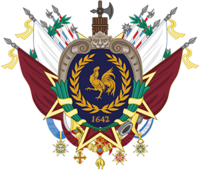Public Assembly of Midrasia: Difference between revisions
m (1 revision imported) |
mNo edit summary |
||
| Line 36: | Line 36: | ||
|election3=3 January 2017 | |election3=3 January 2017 | ||
|seats=572 | |seats=572 | ||
|house1 | |house1=[[Public Assembly of Midrasia|Public Assembly]] | ||
|structure1=File:Midrasia Public Assembly.svg | |structure1=File:Midrasia Public Assembly.svg | ||
|structure1_res=250px | |structure1_res=250px | ||
Revision as of 15:47, 2 April 2019
This article is incomplete because it is pending further input from participants, or it is a work-in-progress by one author. Please comment on this article's talk page to share your input, comments and questions. Note: To contribute to this article, you may need to seek help from the author(s) of this page. |
Public Assembly of Midrasia Assemblée Publique de Mydrazia | |
|---|---|
 | |
| Type | |
| Type | |
Term limits | None |
| History | |
| Founded | 5 March 1791 |
| Leadership | |
Jocelyn Duverger (PP) since 3 January 2017 | |
Teodor Armany (PP) since 3 January 2017 | |
Antoinne LeMahieu (PR) since 3 January 2017 | |
| Structure | |
| Seats | 572 |
 | |
Public Assembly political groups | Reform Bloc |
| Elections | |
| Party-list proportional representation | |
Public Assembly last election | 14 September 2017 |
Public Assembly next election | 12 September 2019 |
| Meeting place | |
| <imgur w="250">Eu4k8kA.jpg</imgur> | |
| Palais del Sud, Parliament Square, Lotrič | |
The Public Assembly of Midrasia (Midrasian: Assemblée Publique de Mydrazia) is the lower house of the Parliament of Midrasia, which along with the upper house, the Senate make up the legislature of the Republic of Midrasia. Within the Constitution of 1791 the Public Assembly is outlined as an entirely elected body, with each member of the Assembly representing one national constituency, utilising a system of first-past-the-post. As of 1996 however, this has changed with the Assembly adopting a system of party-list proportional representation under the d'Hondt system for allocating seats, with elections taking place every two years. One seat within the Public Assembly represents every 180,000 people, or part thereof within the electorate. The number of seats within the Assembly is reviewed every four years by the Electoral Commission.
As the lower house of the Midrasian parliament, the Public Assembly is charged with the passage of legislation, known as bills, which, after concurrence by the Senate, are sent to the Consul for consideration. In addition to this basic power, the House has certain exclusive powers which include the power to initiate all bills related to revenue and the impeachment of federal officers, who are sent to trial before the Senate. The assembly is presided over by the Speaker of the Public Assembly, normally from the largest political bloc represented. The Speaker is assisted by the clerk of the Public Assembly and their assistants who are tasked with recording the business of the house and ensuring that parliamentary procedure is followed. As elections take place every two years for the entirely of the Public Assembly, the body has the tendency to lead to divided government and the necessity for the leading bloc to form parliamentary coalitions or confidence and supply agreements, which have led to a more partisan environment.
As of the 2017 elections the largest party in the Public Assembly is the Progressive Party of the Reform Bloc with 134 seats and control over the speakership. The Chartist Bloc is the official opposition and is led by the Republican Party who hold 116 seats.
Membership
Qualifications
According to the Constitution of 1791, following the Nineteenth Amendment, the only qualification to be a member of Parliament is to be a Midrasian citizen who is eligible to vote in elections. Although this originally only allowed property owning males over the age of 21 to become members of Parliament, though following the amendment any Midrasian citizen over the age of 18 to become a member of either the Senate or Public Assembly.
Elections and term
Elections to the Public Assembly take place every two years. Elections utilise a party-list proportional representation system, using the {wp|d'Hondt system}} to allocate seats. One seat in the Public Assembly is allocated for every 180,000 people or part thereof within the electorate. As there are no constituencies for elections to the Public Assembly in the situation where a member of the House dies, or is removed from office, he or she will simply be replaced by the next member of their particular political party on the electoral list. Elections for the Public Assembly last for around 4 weeks and usually take place when parliament is adjourned. There are strict spending limits placed on senatorial elections, with each party only able to spend a specified amount each year on national and local advertising. This amount is reviewed every year by the Electoral Commission. Each party is allocated a slot on national broadcasting agencies during an election period to air advertisements during an election campaign.
Salary and benefits
Members of the Public Assembly receive an annual salary of Đ100,000, equal to the salary of a member of the Senate. The Speaker of the Public Assembly receives an additional Đ25,000 on top of their regular Parliamentary salary. Each member of the Public Assembly is provided their own office within the Parliamentary Offices to the east of Parliament Square. Members of the Public Assembly are also entitled to claim Parliamentary allowances for expenses relating to their official work. This may include, but is not limited to: travel expenses and Office costs. All expenses are recorded in the Parliamentary 'red books' and are reviewed and published following each Parliamentary term.
Expulsion and other disciplinary actions
The Midrasian Constitution does not give any references to a procedure for the removal of a member of Parliament, however statute law does enable the creation of Investigatory Committees, whether in Parliament on the Midrasian Police Forces, to review the activities of sitting members. Whilst there is no official procedure to remove a member of the Public Assembly, party leaders are empowered to ask a sitting member of parliament to resign which is usually sufficient to force the targeted member to step down.
Officers
Speaker of the Senate
Majority and Minority Leader
Party leaders
Non-voting officers
Procedure
Current composition
- Further information: List of political parties in Midrasia
| |||||||||||||||||||||||||||||||||||||||||||||
